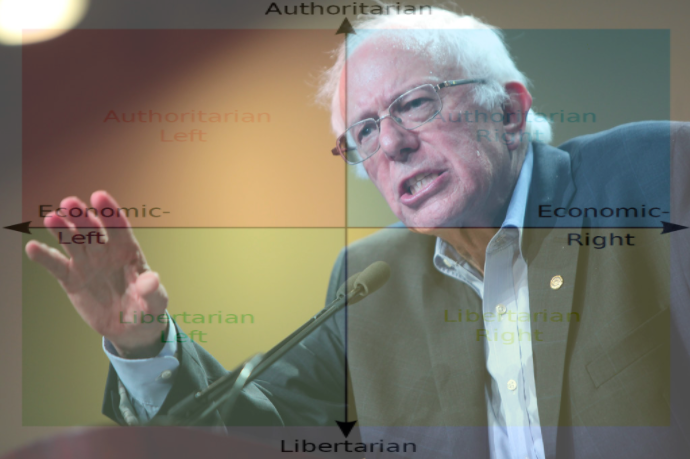Mapping Bernie Sanders
To understand Bernie Sanders’s political ideology, we can do better than “socialism”
April 7, 2020
There are few words that are as widely misused and misunderstood in American politics as the term “socialism.”
Most Americans fundamentally do not understand trends in economic policy outside of the States, and this confusion is amplified by the U.S. long and devoted history with free-market capitalism. This leads to “socialism” being used as a catch-all term for any legislation that moves us away from a free market economy. Bernie Sanders is a willing victim of this misunderstanding, and to best understand his policies against the backdrop of U.S. and global politics, we must explore and properly identify true signs of socialism.
While it is true that “socialism” is a fairly vague term, there are some parameters we can apply to it. Socialism is a staunchly anti-capitalist ideology that believes that the means of labor and production ought to be in the collective hands of the laborers, not in the hands of wealthy capitalists. The most recognizable and notable form of socialism is Marxist socialism, which went on to influence Maoism and Bolshevism. None of these doctrines share much in common with Sanders’s ideology beyond a preference for a stronger government. His calls for sturdier social security and welfare systems, for example, do not assume government control over the means of production.
But this begs the question, what is Sanders? The answer can be found in another economic ideology rooted in the 19th and 20th centuries: social democracy. This system (and its historical adherents) must be fully understood to get a grasp on what Sanders believes and what his possible presidency could entail.
Social democracy, while not being socialism, shares some similarities with the ideology. Both advocate for change in terms of how we run our economy, believing that the current system is immoral and unjust. However, where these two strains of political thought split is what their response to this injustice is. While socialists advocate for total abolishment of the capitalist system (and often class warfare), social democrats believe that capitalism can be reformed in order to secure rights and safety for the working class. Social democrats believe this can be achieved by increasing social and welfare spending, increasing taxation on the wealthy and ensuring that proper work conditions and wages are secured.
Many past and current social democrats with economic policies closely mirroring Sanders’s would vehemently deny being labeled as socialists. One such example is Huey Long, a Louisiana Democratic senator who served during the interwar period. He was a social democrat, but when accused of being a communist claimed that his “Share the Wealth” redistribution plan was “the only defense this country’s got against communism.” A more modern example of socialism-averse social democracy is the ruling party in Poland, Law & Justice. This party is avowedly opposed to communism and all socialistic doctrines, but also supports welfare policies and a universal healthcare system.
All of this evidence clearly rings out the verdict on Sanders’ so-called “socialism.” Sanders is currently firmly rooted in the social democratic tradition of ideas. While it is possible that Sanders calls himself a socialist out of ignorance, it is equally possible that he calls himself one on purpose, with the intent of stirring up controversy and increasing interest and attention towards his ideas. But the next time you see Sanders described as a socialist, remember that political labels are more nuanced than they seem.









Alan Goldstein • Apr 21, 2020 at 12:33 PM
You wrote:
“While it is possible that Sanders calls himself a socialist out of ignorance,…”
It is an irrational statement that such eminence & such brilliant American Leader would call himself “socialist out of ignorance”
Think about why your statement is irrational & spreads ignorance.
Best Regards,
LG